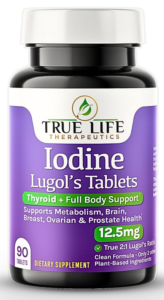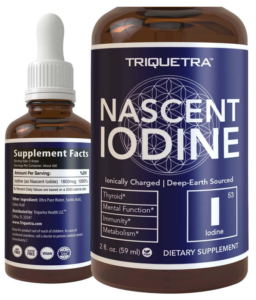Iodine Deficiency? What You Need to Know About this Overlooked Mineral

Feeling tired, foggy, or struggling with hair loss?
It might not be stress — you might be iodine deficient.
Are you iodine deficient? Iodine is one of the most essential — and most overlooked — minerals your body needs. It’s crucial for thyroid function, hormone balance, detox, and even hair growth. And yet, studies estimate that over 70% of the population may be deficient, especially in areas without iodine-rich foods or iodized salt.
Iodine deficiency is more common than many people realize—and it often goes unnoticed for years.
Iodine plays a critical role in thyroid health, metabolism, hormone balance, and overall energy levels. When levels are too low, the effects can quietly ripple through the body, contributing to fatigue, cold sensitivity, brain fog, dry skin, and other symptoms that are often blamed on aging or stress instead of a nutrient imbalance.
Understanding iodine deficiency isn’t about self-diagnosing or chasing quick fixes. It’s about recognizing how essential this trace mineral is, why deficiency has become more common, and how awareness can support better long-term health decisions. Addressing nutrient deficiencies is an important part of building better health as we age, especially when symptoms are subtle and long-standing.
Let’s explore what iodine actually does, how to recognize iodine deficiency, the difference between iodine types, and how to use it safely.
Why Iodine Matters
Iodine is a trace mineral used primarily by the thyroid gland, which controls metabolism, energy, and hormone production. But iodine’s importance goes way beyond the thyroid.
Your body uses iodine for:
-
Producing thyroid hormones (T3 and T4)
-
Hair growth and follicle health
-
Mental clarity and mood balance
-
Immune support
-
Detoxification of heavy metals and fluoride
-
Cellular health and cancer protection
In fact, every cell in your body has iodine receptors — not just your thyroid. This means even if your thyroid seems fine, low iodine may be impacting your brain, breasts, ovaries, or prostate. Iodine doesn’t work in isolation—factors like magnesium and mineral balance also influence how well the body functions overall. Another overlooked natural healer is DMSO. Be sure to consider the benefits.
Signs You May Be Iodine Deficient

-
Fatigue or sluggishness
-
Dry skin or brittle hair
-
Hair thinning or loss (especially at the crown or eyebrows)
-
Sensitivity to cold
-
Brain fog or forgetfulness
-
Hormonal imbalance (irregular periods, infertility)
-
Depression or low mood
-
Enlarged thyroid or goiter
What Causes Iodine Deficiency?
Several modern factors contribute to iodine depletion:
-
Low iodine in soil and food
-
Avoidance of iodized salt (often swapped for Himalayan or sea salt without iodine)
-
High exposure to halogens like fluoride, chlorine, and bromine (which compete with iodine)
-
Radiation exposure
-
Vegan or low-seafood diets
“This is not a short video—and it isn’t meant for everyone. But if you’ve struggled with thyroid problems, unexplained fatigue, brain fog, hormonal imbalance, or have been told ‘your labs are normal’ while you still don’t feel well, this conversation may be worth your time. In this in-depth talk, an English physician explains the often-overlooked role of iodine in human health, why deficiency has become more common, and how modern diets may be quietly undermining thyroid function. Because iodine can be powerful and highly individual in its effects, it’s wise to work with a knowledgeable healthcare practitioner who understands iodine and thyroid physiology before making changes to supplementation.”
Iodine vs Nascent Iodine: What’s the Difference?
There are many forms of iodine supplements, but two of the most common are potassium iodide and nascent iodine.
Potassium Iodide (KI):

-
Found in tablets and drops
-
Used in emergencies for radiation exposure
-
Less bioavailable for everyday use
Nascent Iodine:
-
A more bioavailable, atomic form of iodine
-

Click to order Nascent Iodine Mimics the iodine your body naturally produces
-
Absorbed faster and more efficiently
-
Preferred for daily supplementation, detox, and thyroid support
Bottom line: For daily health, nascent iodine is often gentler and better absorbed.
How Much Iodine Should You Take?
The recommended daily allowance (RDA) is only 150 mcg — just enough to prevent goiter, but not enough to optimize health.
Many holistic practitioners suggest:
-
150–300 mcg/day for basic support
-
Up to 12.5 mg/day (like in Iodoral tablets) for therapeutic purposes — under guidance
-
Pregnant/breastfeeding women: may need 220–290 mcg daily
Does Body Weight Affect Dosage?
Yes — larger individuals or those with higher toxic load (from fluoride, bromine, etc.) may need more iodine to reach a therapeutic level.
However, iodine should be started slowly, and always balanced with:
-
Selenium (200 mcg/day) — protects the thyroid and prevents detox overload
-
Magnesium and vitamin C — support adrenal and cellular function during detox
What Happens If You Take Too Much Iodine?
-
Nausea or headache
-
Racing heart
-
Acne or skin rash
-
Thyroid flare-up (if pre-existing autoimmune issues are present)
If you notice these symptoms, reduce your dose or stop and detox with vitamin C and salt-loading protocols (ask a practitioner if unsure).
Other Uses for Iodine
-
Topical disinfectant (Lugol’s solution)
-
Mouth rinse for gum issues
-
Breast health (applied topically or taken orally for fibrocystic issues)
-
Radiation protection during emergencies
-
Wound healing — combined with DMSO or aloe vera for deeper tissue repair
Final Thoughts: Iodine is Your Silent Ally
So many modern issues — chronic fatigue, hair thinning, infertility, thyroid imbalance — may actually stem from this single, often-ignored nutrient.
Adding nascent iodine to your daily regimen could restore clarity, support your thyroid, boost your mood, and help your body detox harmful chemicals.
Start small. Go slow. Listen to your body.
Iodine deficiency is rarely dramatic, but its effects can quietly influence energy, clarity, and overall well-being over time. By understanding the role iodine plays—and how modern diets and environmental factors may contribute to deficiency—we can make more informed, thoughtful choices about health.
Awareness is the first step. When symptoms are viewed in context rather than isolation, it becomes easier to see how small imbalances can have widespread effects—and how supporting the body properly can make a meaningful difference.
If you’re iodine deficient – you might be surprised how quickly it responds to what it’s been missing all along. Another nutrient that is often overlooked is DMSO – be sure to learn about the awesome benefits.
Please contact me with any questions or comments. Be sure to browse more helpful articles in this website.

